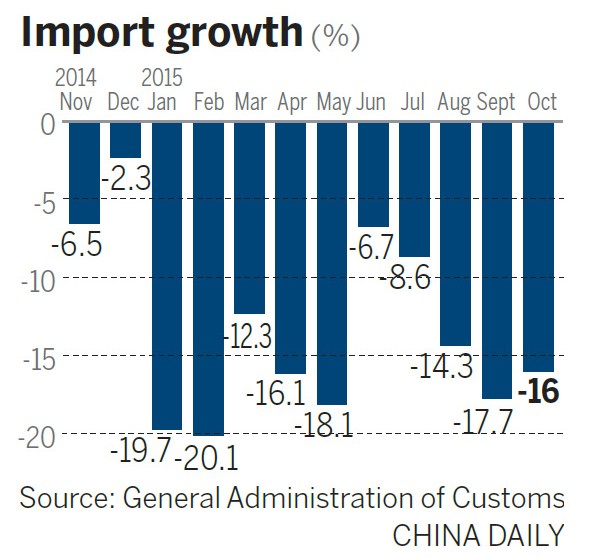China needs to streamline regulation, trade specialists have said, following a sharp decline in imports for the first 10 months of 2015.
Although consumption brought about by Chinese tourists grew at a steady pace of 25 percent from 2005, imports from January to October decreased by 15.2 percent year-on-year to 8.47 trillion yuan ($1.33 trillion).
In October, China's total foreign trade, which includes imports and exports, fell by 9 percent to 2.06 trillion yuan. Last month's performance marks the eighth consecutive month of the decline of trade in the country.
As a result of weak performance in imports, China's trade surplus ballooned by 75.3 percent to 2.99 trillion yuan.
For Zhang Jianping, director of the International Economic Cooperation Institute at the National Development and Reform Commission, the decline in imports can be attributed to several factors: China's stable yuan exchange rate, growing incomes, simplified travel restrictions, and the boom of the e-commerce industry.
According to data from Ministry of Commerce, approximately 100 million Chinese travel abroad per year. Their travels account for overseas consumption that amounts to over 1 trillion yuan or 10 percent of global overseas consumption.
"If half of this overseas consumption can flow back to the home market, it would generate a significant rise in China's imports. But to do so, merely cutting some tariffs and setting up duty-free shops is far from sufficient," said Zhang in an interview with China Daily.
Cai Jin, vice president of the China Federation of Logistics and Purchasing, also echoed the same sentiments, saying that too much focus on export channels has pushed the importance of import channels to the side.
"It would be good to allow more overseas logistics facilities and sorting centers to operate import business to China," Cai suggested.
The possibility of upgrading the service industry in the country will be discussed in the meetings for China's 13th Five-Year Plan (2016-20).



























